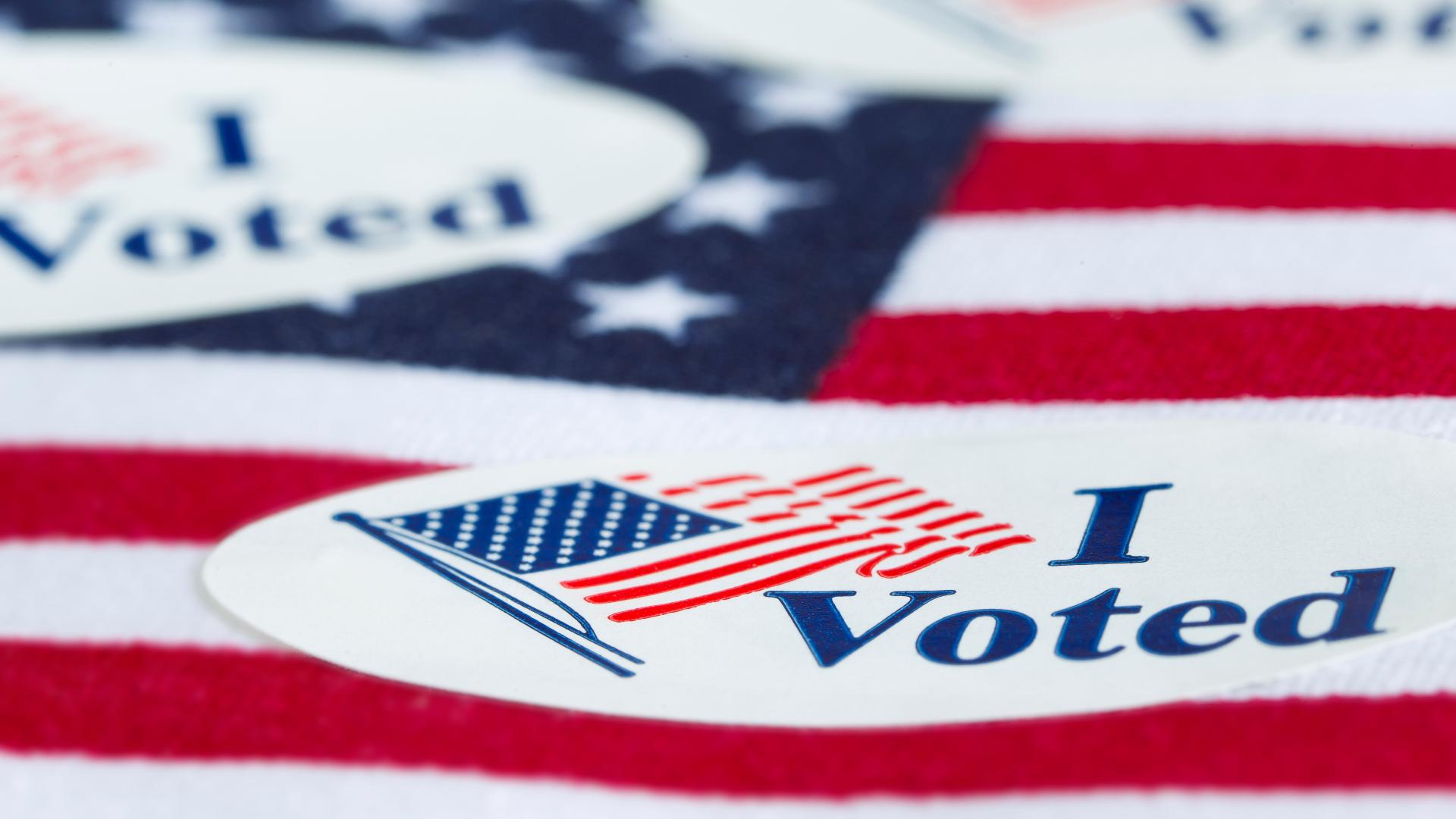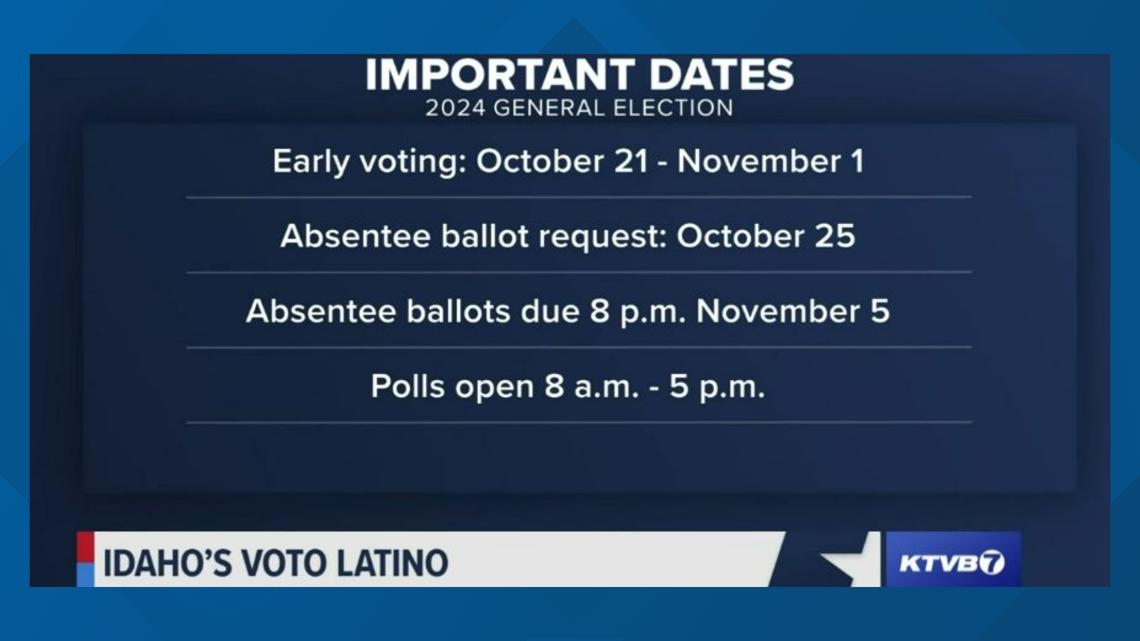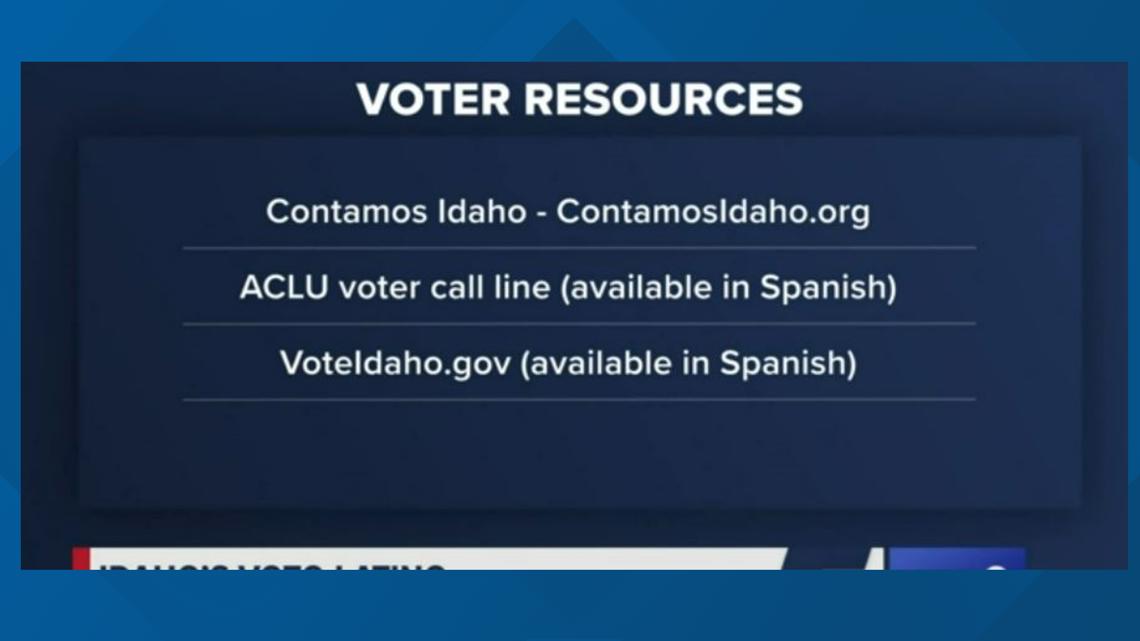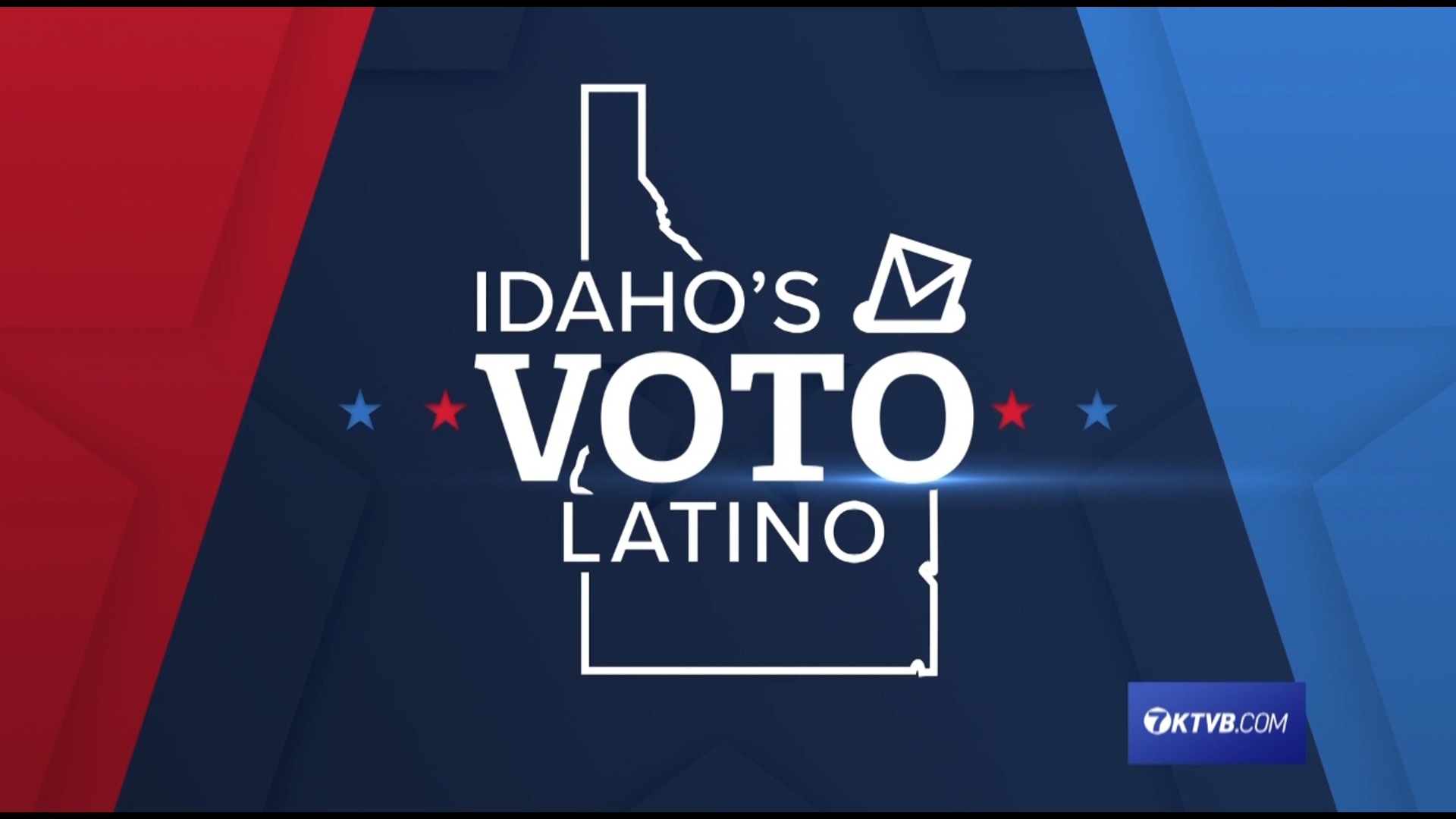2024 Elections: A view of Idaho's Latino vote
According to the 2020 census and Idaho Commission on Hispanic Affairs (ICHA), Hispanics make up 13% of Idaho’s population and live in all of the states 44 counties.

The population Fast Growing Community
Latinos and Hispanics are the second largest group of voting-age Americans and play an important role in the national elections, but that’s also true in the Gem State.
Although, voter data is hard to track when it comes to Idaho’s Hispanic and Latino community, that community outpaces any other groups in the state.
"Idaho is far behind in collecting data based on ethnicity. So, it's really hard for us to really get a good picture,” Gonzalez said.
According to the 2020 census and Idaho Commission on Hispanic Affairs (ICHA), Hispanics make up 13% of Idaho’s population and live in all 44 counties.
“I also see, because of that population of ours, of the Hispanic population, being strong as those 25 years and younger, there is going to be a climate change here in Idaho,” Gonzalez said.
Canyon County has the most Hispanic residents in the state with 62,562, but they only represent 25% of the population. Clark County has the highest percentage of Hispanics, making up 41%.
ICHA reports 70% of Idaho’s Hispanic population are U.S. citizens and old enough to vote. Narrowing it down to who votes, Idaho Hispanics represented 11.1% of voters in the 2022 midterm elections. Compared to the previous election, voter turnout decreased by 2%.
Idaho has two congressional districts. In district one, 10% of the population is Hispanic, and in district 2 13% is Hispanic.
As the Latino/Hispanic population keeps growing Gonzalez said it is not reflected at the voting polls.
"It's one it's one thing to get them registered to vote, but we need to get them to the polls to vote,” Gonzalez said.
She said it’s partly due to the disparities that Latinos face, like language barrier, lack of resources and education.
“I think that we're lacking a lot of education. “We're lacking an organization that will work towards helping our families understand the meaning behind why it's important that they vote,” Gonzalez said.
A group Gonzales said is growing, are the young first-time Latino voters.
“You have not only do you have the right, but you have the responsibility. "Carry that voice forward, because we all owe it to our ancestors, who have worked very hard and continue to work hard for this state,” Gonzalez said.
Gonzalez added, being able to track data like race and ethnicity is helpful to pinpoint which communities have low voter turnout numbers. She said this will help leaders be able to assess helpful resources to those communities.
Brenda Rodriguez
Low Voter Turnout Disparities
It is something that is often said before elections: "This is the most important election ever.” Voter turnout, and who votes and why, is also something that gets focused on prior to elections. While Latinos are the fastest growing minority group in Idaho, and across the U.S., a lot of them still are not showing up to vote.
The American Civil Liberties (ACLU) of Idaho said it has to do with some of the disparities Latinos have to face.
“The right to vote is the most protected constitutional right that we have than any other constitutional right under the US constitution and the state constitution as well," said Leo Morales, executive director for the ACLU of Idaho.
Morales said Latinos face many roadblocks heading to the polls and getting access to resources.
"We've got individuals that are naturalized citizens, we've got individuals that were born here, and so they have birthright citizenship,” Morales said. “We also have in this country, I would say, multiple systems that sometimes discourage individuals from participating in our democracy."
A new report by the Brennan Center, a nonpartisan law and policy institution, stated that nearly 100 laws that make voting more difficult have been enacted in 29 states, including Idaho.
"We have voter ID laws that actually have a disproportionate impact on certain populations,” Morales said. “It has a disproportionate impact on the elderly, low income and individuals where English is not their first language as well."
In addition to Idaho's voter ID law that limits which IDs are acceptable to vote; HB 599, which aims to prevent ballot harvesting, makes it a crime for certain people to collect or deliver another voter's mail-in ballot.
The Brennan report also states the Latino voter turnout was 22% less than the rate of white voters during the last presidential election.
Still another barrier some Latino voters face is language. Spanish-speaking voters are not always able to make an informed decision with limited access to Spanish-language content.
The Secretary of State has a voter guide in Spanish on their website but once people get to the polls, ballots are only in English, with the exception of Clark County in eastern Idaho.
That is due to the Federal Voting Rights Act which requires a state or county to provide language help if more than 5% of voters in that jurisdiction have limited English skills.
Morales said there is also very limited access to translators at the polling locations.
"There is a right for individuals to be able to take an interpreter or someone that can help them to the voting booth," Morales said.
Debbie Critchfield, the Superintendent of Public Instruction for the Idaho State Board of Education, agrees that the language barrier is an issue.
"No question, the language barrier presents a very big challenge for many of our Idaho friends and neighbors,” said Critchfield. “I think that's one of those last pieces to discuss on how to do that, because not everyone is going to have a son or a daughter or relative that can take them."
Critchfield speaks some Spanish, but knows candidates need to do more to reach Latino communities.
“I don't like that I'm going to say this, but I think sometimes we have folks that get overlooked, not because it was intentional,” Critchfield said "We got put into place to represent the people who sent us there and if we're not paying attention to parts of our state, we're not fully doing our jobs, and if that means I'm not able to fully communicate with someone, then i probably need to find others who can."
When she was asked if she had Latinos or people that speak Spanish on her team, Critchfield said no; "No, and as I'm saying this, I need to do better myself," she said.
"It is extremely important to make sure that we continue to create institutions as open as possible, as diverse as possible, so that we can change the pattern of voting for the future," Critchfield said.
Some resources that the ACLU provides to help Spanish speaking voters include a hotline to answer questions and everything people need to know to prepare for election day. People can click here to find those materials.
Hector Mendoza
Clark County Spanish Ballot
In Idaho there are 44 counties in the state, but only one has Spanish translations on their ballot. It’s towards the east near the Montana border, and it’s the Clark County.
The county has been federally mandated since 2021, to have Spanish translations on their ballots, due to section 203 of the Federal Voting Rights Act.
The rule gathers data from the latest census, and if a counties population for language minorities reaches above 5% or 10,000 residents and diminished literacy rates their ballot must have that specific language.
In Clark County’s case, 42.2% of its population speaks another language at home, being Spanish, according to the 2020 census.
Section 203 aims to help language minorities who are eligible to vote, to participate in the electoral process.
However, even though Clark County has had the resources available to them, the Clark County Clerk Stephanie Stewart said it hasn’t translated for more votes.
“Even though our population of Hispanic voters could potentially be super high with 42% of the population being Hispanic. We don't see those numbers on the polls,” Stewart stated. “I think that there's not enough education and with that comes the lack of voters.”
She said during an election cycle she would roughly 300 voters cast their ballots and less than 10%, or 30 Hispanic voters’ vote.
Maria Martinez, a 30-year Clark County resident told KTVB, there are a lot of Hispanics in the county, and it’s a quiet place to live.
She is a dual citizen, which allows her to vote, but never has.
“I didn’t know they had Spanish when someone goes to vote,” she said when asked about the ballot.”
Martinez said she will vote this year.
“The importance of voting is to have a voice for our rights,” she said. “We came to this land as immigrants and we should exercise our right to vote, so they can hear our voice, and we need our rights.”
Martinez said by having Spanish on the ballot it can help eligible voters understand.
Both Martinez and Stewart agreed more education and telling the public about the ballot can help Spanish speaking voters who are eligible to vote can vote.
Stewart said having Spanish on the ballot is a great resource, but almost doubles their cost.
A traditional election would cost the county roughly $3,000, she said. But with the translations it’s about $6,000. The ballot is also longer being four pages, which takes longer to count as they count them by hand.
However, Stewart said 42% of her population is Hispanic and if she wasn’t representing everyone in her county, she wouldn’t be doing her job.
“I think that there's definitely a population that's underserved in the state. It makes sense to me why we're required to have that on our ballot. I definitely think there's an opportunity for other counties to step up and have it on their ballot as well, ,” she said.
In an effort to help Spanish speaking voters she has requested a Spanish translation of the secretary of state’s online voter pamphlet for her community.
Richard Rodriguez
Who is Voting Young Latino Voters
Hispanic voters tend to be younger than other voting groups overall, according to a recent Pew Research report, becoming more civically engaged.
In Idaho, young Latinos are enthusiastic and determined to cast their ballots in the upcoming election.
Diana Colis and Diego Tapia are two Boise State University students who are voting for the first time.
“I get to give my voice and my input, so that's why I'm excited,” said Colis, a 19-year-old Boise State student. Colis is also a first-generation voter in her family.
“My vote isn't just a piece of paper that goes forgotten in thin air,” she said.
Another Boise State student, 20-year-old Tapia, is also excited about voting for the first time.
“It’s a tense environment, but I think it's really important that people get involved,” Tapia said.
Young Latino voters are emerging as a significant force in elections. According to the Brookings Institution, 31% of all Latino eligible voters are between 18 and 29 years old, compared to 21% of all U.S. eligible voters in the same age group.
The Center for Information and Research on Civic Learning and Engagement also reports that 40% of newly eligible Latino/Hispanic voters in the West are between 18 and 19 years old, nearly matching the 42% of white voters in that age group.
Estefania Mondragon, executive director of Poder of Idaho, emphasizes the critical role young people play in voter engagement. “The younger generation has always been at the forefront of any movement,” she said. “It’s young people wanting to get the message out there about the importance of being civically engaged.”
The Idaho Commission on Hispanic Affairs shows that people aged 20 to 24 make up the second largest age group in Idaho’s growing Latino/Hispanic community, meaning many of them are now eligible to vote.
With the upcoming presidential election, certain topics are motivating young Latinos to head to the polls. Mondragon discussed that many young Latino voters are concerned with social equity.
“They want to see changes, and they want the government to have a voice in that,” Mondragon said.
For Colis, social policies are important when casting her vote.
“I look for equality, justice, acceptance, and respect,” she said.
Tapia agreed, adding that abortion rights, LGBTQ rights, and immigration are also issues he prioritizes when considering his vote.
Mondragon believes any change starts with voting.
“Whether they're Democrat, Republican, Constitution, Libertarian, we want Latinos to make their voices heard,” she said.
Colis encourages other young Latinos to take action: “Go vote. It’s important. Your vote counts. It’s our future.”
Tapia also emphasized the power of voting stating; “Don’t let anyone tell you how to vote, but I definitely encourage you to be part of the process and show the power we have as Latinos and as a greater community.”
Daisy Bautista
Resources




You can read more on specials by KTVB's En Español team here.


